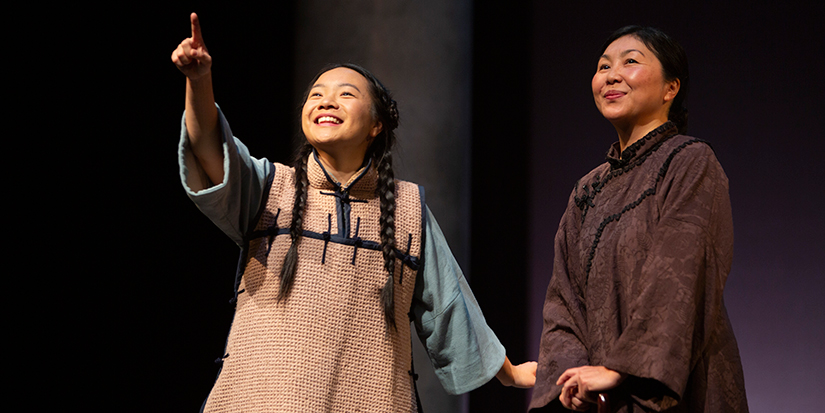Arts & Culture
"China Doll" bound to tradition

—
The smaller a girl’s feet, the more marriageable she was in early 20th century China.
Marjorie Chan’s China Doll, which she also directs, is on now at Gateway Theatre. The play grapples with the practice of foot binding and its implications for girls’ independence.
The lights come up on five-year-old Su-Ling (Jennifer Tong) having her feet bound by her often harsh grandmother, who she calls Poa-Poa (Manami Hara). Hara deftly shows Poa-Poa’s stoic exterior while also allowing glimpses into the woman underneath, desperate for her granddaughter to lead a better life.
As she grows up, Su-Ling learns to adopt the walk her mother and grandmother have already mastered. “Mama, why are our feet the same size?” she asks as a child, not fully aware of the societal implications of tightly bound “lotus feet.”
Donna Soares plays Su-Ling’s mother, and later her servant Ming. Once Su-Ling cracks Ming’s hard exterior, Soares unleashes her full emotional range with great success.
Soares says that the shoes worn onstage are essentially high heels without the heel part, and that they are not as uncomfortable to walk in as they look. The shoes looked believable from the audience.
Orphaned at a young age, Su-Ling struggles to please her Poa-Poa while secretly learning how to read. She is helped by Merchant Li (former Gateway artistic director Jovanni Sy). Although his role is challenging, Sy is compelling and subtle.
Class difference presents an ongoing conflict. Su-Ling tries to make friends with Ming, who is initially markedly lower-class and has unbound feet. When Ming is chosen to be Su-Ling’s servant, their budding friendship is stifled.
Tong shifts seamlessly between Su-Ling’s different personalities. With her grandmother she appears subservient and meek; with Merchant Li she is free to be curious and inquisitive.
She often slips back into a childlike innocence. Tong has mastered these childhood scenes, whether flashbacks or moments in the present that propel Su-Ling back into her childhood mindset. At times I nearly forgot I was watching an adult actress. Her childlike mannerisms were entirely believable.
Because China Doll deals with intense material, the team worked with intimacy director Lisa Goebel. Sy called the experience “sensitive and professional.”
Chan’s intense script also yields moments of humour, especially Tong and Hara’s physical comedy. The two women strive to appear ‘proper ladies’ in public in the hopes of attracting a husband for Su-Ling, which often incited laughter from the audience.
Some dialogue was difficult to hear near the back of the unamplified Gateway, particularly when coupled with the nearby rustling of snack wrappers.
Heipo Leung’s stage centered around columns wrapped with cloth, mimicking bound feet. Lighting by Chengyan Boon includes Chinese characters projected onto the columns, surrounding Su-Ling with words as she learns to understand them.
Henrik Ibsen’s play A Doll’s House helps inspire Su-Ling to see the possibilities of a future that is literally and figuratively unbound.
Motivated by its main character Nora, as well as political and feminist writings borrowed from Merchant Li, Su-Ling begins to take steps away from the life she was born into.
The final scene returns to the crucial relationship between Su-Ling and her Poa-Poa.
“You are stronger than me,” Poa-Poa tells her granddaughter. “You will survive.”
Although her past has often been out of her hands, Su-Ling boldly seizes control of her future.
Before the memorable foot binding scene, there was a brief vignette of an older Su-Ling with a cane talking to her Poa-Poa. I forgot about this scene until after the play, when two other audience members said they found it confusing.
This scene may have been intended to frame the entire play as a flashback, but unfortunately it was so brief that it didn’t stick in my mind.
China Doll is poignant and emotional. At its core, it presents the story of a girl bound by tradition. Su-Ling fears disappointing her grandmother but insists that life is “not about survival.”
The play is presented with Traditional and Simplified Chinese surtitles. Making local theatre more accessible is hugely beneficial, and I hope Richmond’s Mandarin- and Cantonese-speaking populations accept this hand offered in friendship. As many people should be able to devour live theatre as possible.
Trail Appliances sponsored the opening night. Tasty reception appetizers were courtesy of the Sheraton Vancouver Airport Hotel and Harold’s Kitchen & Bar, with cake from Anna’s Cake House.
China Doll plays at Gateway theatre through Oct. 26 with many special performances, so check the website. Wheelchair accessible seating is available. Buy tickets at https://tickets.gatewaytheatre.com or by calling 604-270-1812.






























